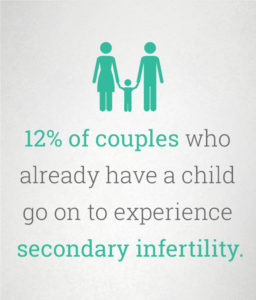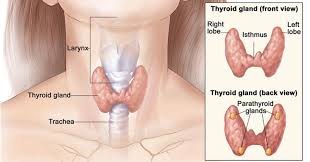If you already had one or more healthy full-term pregnancies and you are very fertile and think you will go on to have more healthy pregnancies is a myth. Infertility can happen to anyone, at any time with little or no warning. Couples

who have had one or more biological children without the assistance of reproductive technology or fertility medications, but are unable to conceive or carry to term another pregnancy have Secondary Infertility. If one of you has a biological child from a previous relationship and you are still unable to achieve a pregnancy or carry to term in a new relationship, this is also defined as Secondary Infertility.
Around 12% of women in the United States are diagnosed with infertility. Secondary Infertility accounts for nearly half of all infertility diagnosis. If you already have a child or children but have been struggling to get pregnant this time around, see a doctor to see what is going on. If you have been trying for a year or more to get pregnant, or if you are over the age of 35 and have been trying for 6 months or longer without success, it is time to see what is going on.
Warning Signs
There are warning signs that you should take action right away – they are:
- Irregular or very painful menstruation
- More than two or more miscarriages
- History of STI’s
- History of fertility related issues such as endometriosis, ovarian cysts, etc.
- History of other health related problems such as diabetes, obesity, thyroid issues, alcoholism, drug addition, autoimmune disease, etc.
- History of hormonal birth control use
Why does Secondary Infertility Happen?
The Age Factor
As we age our body systems are not as vital as they once were. This is especially true if there are poor eating habits, lifestyle choices and high stress. While we cannot reverse the aging process, we can support our health in the best way possible through good diet choices, healthy lifestyle practices and regular stress reduction techniques. This goes for male partners as well. Sperm health can decline as men age.
Fertility can decline for women over the age of 35. Begin to support your body in the healthiest ways possible now.
Cesarean Section (C-section)
If you had a cesarean section birth there may be a chance that there is scar tissue damage to the uterus or fallopian tubes making another pregnancy more difficult. Scar tissue damage in the uterus can make implantation difficult. Scar tissue damage to the fallopian tubes may cause them to become blocked, making pregnancy impossible. The risk of this happening is very low, but increases if there was an infection present.
Hyperthyroidism
Postpartum thyroiditis has been found to occur in 7% of women within the first year after childbirth. Overactive tissue in the thyroid gland leads to overproduction of thyroid hormones. This is most commonly caused inflammation of the thyroid, called thyroiditis. This can be caused by a variety of reasons, may be prolonged even after the first year postpartum and may lead to Hashimotos thyroiditis. If you had this, you may want to have your thyroid checked again, just to make sure thyroid function is optimal.
Obesity
If there has been a lot of weight gain since the birth of your last child, it is important to know that obesity increases the risk of infertility. Studies have shown women with a BMI of 35 were 26% less likely to naturally conceive on their own, compared to overweight to normal weight women. Women with a BMI of 40 or more, were 46% less likely to conceive on their own.
Obesity in men lowers testosterone levels. Chronic low levels of testosterone affect how the testes function, which causes all hormones produced by them, to be out of balance. This may also lead to lowered function of producting mature sperm.
What about Unexplained Infertility?
Maybe you have had a full work-up with your doctor and the consensus is unexplained infertility, which means they have no idea why you are struggling to have a baby.
Hormonal Birth Control Use
Using hormonal birth control at any time can contribute to Secondary Infertility. Issues from its use can show up after a first child has been conceived.
Emotional Guilt and Stress Play Important Roles
Because you already have lots of responsibilities as a parent, to add Secondary Infertility on top of that can be extremely draining to all. It is extremely important to take care of yourself through stress management techniques. Stress in and of itself can contribute to fertility problems. Find a support group, seek counseling, be open and honest with your partner. There are many natural options for fertility health related issues. You are not alone and there are resources available to you.
For help with stress, fertility help and guidance, trying to figure out the reasons you are struggling with Secondary Infertility, understanding the role of hormonal birth control and how to counteract its effects, contact me below and we can evaluate what has been contributing to this issue and develop a plan of action to help you conceive your next baby. You are not alone – there is help available.




